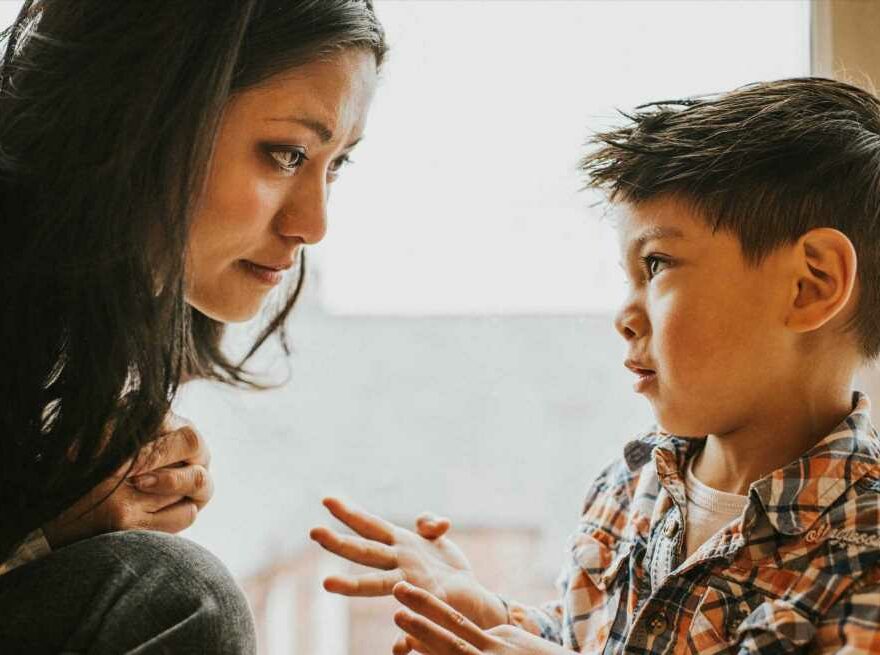A PARENTING coach has shared the four everyday phrases that parents should stop using around their kids – plus what to say instead.
And there’s some surprising additions to the list, as the parenting pro says go-to compliments for children like ‘great job’ should be banned altogether.
Aussie Genevieve Muir appeared on Australian TV show, The Morning Show, to discuss her advice on why some cliches could do more harm than good.
The mum-of-four, who is also a social worker, sat on the sofa alongside the guests, as she went through the phrases one by one, starting out with ‘you’re fine’.
She explained: “We want our kids to know that they can come to us both when they’re happy and when they’re sad.
“And when we say, ‘you’re ok, you’re fine, dust it off,’ we do this because we want them to be ok, but actually what we want them to know is that sometimes it’s ok to not be ok.”
Read More in Parenting
I’m a lazy mum and my slow cooker pasta is so easy and tastes unreal
Mum slammed for preparing her kid’s packed lunch FIVE weeks in advance
Instead, Genevieve, who goes by Gen, said mums and dads should opt to ask, ‘are you ok?’
She added: “That lets our kids know that they can come to us with their problems, long-term.”
Gen, who shares her parenting tips on her social media platforms including via her TikTok profile @connectedparentingau, then went on to phrase number two – ‘be careful.’
Although she did admit it was sometimes challenging to refrain from saying this one out loud.
Most read in Fabulous
Kate & Wills share adorable snap of Princess Charlotte after 8th birthday
I’m a sexpert & you SHOULD sleep with your ex… as long as you stick to 3 rules
We're sizes 4 – 24 & tried on the same Primark outfits… the cargos were a fail
People are just realising where their socks really go when they vanish
She revealed: “As a mum of four boys, I’m going to tell you, I either think this or I say this about a million times a day.
“But actually what we know is that if we overuse ‘be careful’ and we’re hovering over our kids, we’re not giving them the opportunity to take risks and learn how to use their body safely.”
So what should parents say instead?
“Actually sometimes – as hard as it is – you want to sort of say nothing. Hold it in, take a deep breath and trust our kids.”
However, Gen then noted times when you’d need a phrase in your backpocket, for instance if your toddler was running towards a busy road.
She explained: “We know that if you say ‘stop running!’ the child will hear one of the two words – and it’s not going to be stop.
We want our kids to know that they can come to us both when they’re happy and when they’re sad
“They’re just going to hear the word running. So what you can say instead is what you want them to do – walking.”
She clarified that instead of using a general phrase like ‘be careful, it’s best to point out the danger and then ask if they can see it so that they can “build that awareness themselves.”
The third phrase on the list is another common one – ‘great job.’
“But if we really want to motivate our kids intrinsically to do well, it’s actually better to do something where we focus more on what motivated them to do well.”
Genevieve continued: “There’s no problem with occasionally saying ‘great job’ or ‘good girl’ or ‘good boy’.
With this in mind, the parenting guru said it would be more beneficial to ask a little one ‘Wow, you did it all by yourself. How do you feel?’
FABULOUS BINGO: Get a £20 bonus & 30 free spins when you spend £10 today
The fourth and final saying on the list is all to do with getting your kids to apologise when they’ve done something wrong.
She asked: “Hands up if you’ve ever tried to make a young child say sorry. It doesn’t go well, does it?
“They’re like, ‘nope, it wasn’t my fault, I’m not going to say sorry.’
“But what we know from evidence is that it also doesn’t teach kids that underlying ability to be compassionate and empathetic.
“So what I try to do with my kids is get them to check in on the other person.”
Gen concluded that by switching from telling a child to ‘say sorry’ to asking them if someone else is ok, we’re encouraging them to develop these attributes.
She said: “We come alongside our child and we say, ‘this all went a bit wrong, shall we check in on your brother as he seems to be crying.’
Read More on The Sun
Mum says she and her three-year-old son were snack shamed by his nursery
Fashion fans scramble to Primark to nab £20 boots that scan at £1 at the till
“That allows our kids to do that and that fosters long term the ability to be compassionate and, eventually, say sorry when we make a mistake.”
Fabulous will pay for your exclusive stories. Just email: [email protected] and pop EXCLUSIVE in the subject line
Source: Read Full Article










